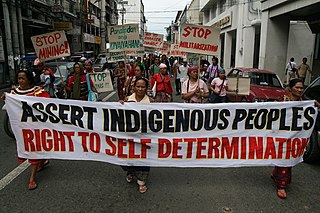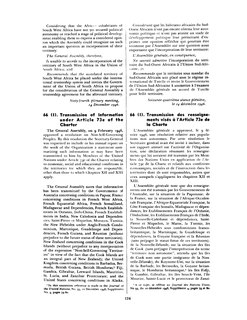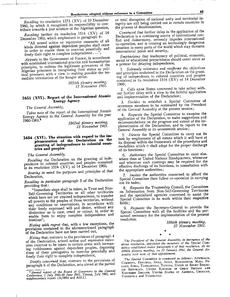
In modern parlance, a colony is a territory subject to a form of foreign rule. Though dominated by the foreign colonizers, colonies remain separate from the administration of the original country of the colonizers, the metropolitan state. This administrative colonial separation makes colonies neither incorporated territories nor client states. Some colonies have been organized either as dependent territories that are not sufficiently self-governed, or as self-governed colonies controlled by colonial settlers.

The right of a people to self-determination is a cardinal principle in modern international law, binding, as such, on the United Nations as authoritative interpretation of the Charter's norms. It states that peoples, based on respect for the principle of equal rights and fair equality of opportunity, have the right to freely choose their sovereignty and international political status with no interference.

The United Nations Trusteeship Council is one of the six principal organs of the United Nations, established to help ensure that trust territories were administered in the best interests of their inhabitants and of international peace and security. The trust territories—most of them former mandates of the League of Nations or territories taken from nations defeated at the end of World War II—have all now attained self-government or independence, either as separate nations or by joining neighbouring independent countries. The last was Palau, formerly part of the Trust Territory of the Pacific Islands, which became a member state of the United Nations in December 1994.

Independence is a condition of a person, nation, country, or state in which residents and population, or some portion thereof, exercise self-government, and usually sovereignty, over its territory. The opposite of independence is the status of a dependent territory. The commemoration of the independence day of a country or nation celebrates when a country is free from all forms of foreign colonialism; free to build a country or nation without any interference from other nations.
A United Nations General Assembly resolution is a decision or declaration voted on by all member states of the United Nations in the General Assembly.
Decolonization or decolonisation is the undoing of colonialism, the latter being the process whereby imperial nations establish and dominate foreign territories, often overseas. Some scholars of decolonization focus especially on independence movements in the colonies and the collapse of global colonial empires. Other scholars extend the meaning to include economic, cultural and psychological aspects of the colonial experience.

Chapter XI of the United Nations Charter defines a non-self-governing territory (NSGT) as a territory "whose people have not yet attained a full measure of self-government". In practice, an NSGT is a territory deemed by the United Nations General Assembly (UNGA) to be "non-self-governing". Chapter XI of the UN Charter also includes a "Declaration on Non-Self-Governing Territories" that the interests of the occupants of dependent territories are paramount and requires member states of the United Nations in control of such territories to submit annual information reports concerning the development of those territories. Since 1946, the UNGA has maintained a list of non-self governing territories under member states' control. Since its inception, dozens of territories have been removed from the list, typically when they attained independence or internal self-government, while other territories have been added as new administering countries joined the United Nations or the General Assembly reassessed the status of certain territories.

The International Court of Justice Advisory Opinion on Western Sahara was a 1975 advisory, non-binding opinion by the International Court of Justice (ICJ) of two questions presented to it by the UN General Assembly under Resolution 3292 regarding the disputed territory of Western Sahara. Morocco had approached the UN to adjudicate its and Mauritania's claims over the territory.

To assist in the decolonization process of the Spanish Sahara, a colony in North Africa, the United Nations General Assembly in 1975 dispatched a visiting mission to the territory and the surrounding countries, in accordance with its resolution 3292.
The Declaration on the Granting of Independence to Colonial Countries and Peoples, also known as the United Nations General Assembly Resolution 1514, was a resolution of the United Nations General Assembly during its fifteenth session, that affirmed independence for countries and peoples under colonial rule.
United Nations Security Council Resolution 163, adopted on June 9, 1961, after General Assembly Resolution 1603 declaring Angola a Non-Self-Governing Territory the Council reaffirmed that resolution calling on Portugal to act in accordance with the terms. The Council called upon the Portuguese to desist from repressive measures and to extend every facility to the Sub-Committee on the Situation in Angola, appointed under the terms of the GA resolution, as well as expressing its hope that a peaceful solution will be found and requested that the Sub-Committee report to the Council and GA as soon as possible.

The United Nations General Assembly Fourth Committee is one of six main committees of the United Nations General Assembly. It deals with a diverse set of political issues, including UN peacekeeping and peaceful uses of outer space. However, the issues of decolonization and the Middle East take up most of its time.

United Nations Security Council resolution 566, adopted on 19 June 1985, after recalling resolutions 269 (1969), 276 (1970), 301 (1971), 385 (1976), 431 (1978), 432 (1978), 435 (1978), 439 (1978), 532 (1983) and 539 (1983), the Council expressed concern at the tension and instability caused the continued occupation of Namibia by South Africa, noting the apartheid policies implemented in the territory and that the territory was used as a springboard for attacks on other southern African countries.

The political status of Puerto Rico is that of an unincorporated territory of the United States. As such, the island of Puerto Rico is neither a sovereign nation nor a U.S. state. Because of that ambiguity, the territory, as a polity, lacks certain rights but enjoys certain benefits that other polities have or lack. For instance, in contrast to U.S. states, Puerto Rico residents cannot vote in U.S. presidential elections nor can they elect their own senators and representatives to the U.S. Congress. On the other hand, in contrast to U.S. states, only some residents of Puerto Rico are subject to federal income taxes. The political status of the island thus stems from how different Puerto Rico is politically from sovereign nations and from U.S. states.

The Malaysia Agreement or the Agreement relating to Malaysia between United Kingdom of Great Britain and Northern Ireland, Federation of Malaya, North Borneo, Sarawak and Singapore (MA63) was the agreement which combined North Borneo, Sarawak, and Singapore with the existing states of the Federation of Malaya, the resulting union being named Malaysia. Singapore was later expelled from Malaysia, becoming an independent state on 9 August 1965.
The Blue Water Thesis or "Salt Water Thesis", was a limited decolonization approach arising from United Nations General Assembly Resolution 637, which linked self-determination with non-self-governing territories.
United Nations General Assembly Resolution 1541 of 15 December 1960, titled "Principles which should guide members in determining whether or not an obligation exists to transmit the information called for under Article 73e of the Charter" was a resolution of the United Nations General Assembly during its fifteenth session with annexes of 12 principles, that affirmed that to ensure decolonisation, complete compliance with the principle of self-determination is required.
The proposed political status for Puerto Rico encompasses the different schools of thought on whether Puerto Rico, currently an unincorporated territory of the United States in the form of a commonwealth, should change its current political status. Although there are many differing points of view, there are four that emerge in principle: that Puerto Rico maintains its current status, becomes a state of the United States, becomes fully independent, or becomes a freely associated state.

A territory is an area of land, sea, or space, particularly belonging or connected to a country, person, or animal.

The United Nations Special Committee on the Situation with Regard to the Implementation of the Declaration on the Granting of Independence to Colonial Countries and Peoples, or the Special Committee on Decolonization (C-24), is a committee of the United Nations General Assembly that was established in 1961 and is exclusively devoted to the issue of decolonization.











